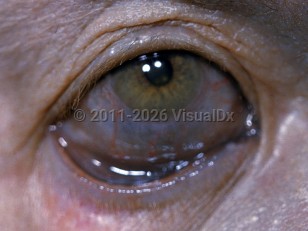Argyria - External and Internal Eye
See also in: Overview,Nail and Distal DigitAlerts and Notices
Important News & Links
Synopsis

Generalized argyria is characterized by a diffuse bluish-gray discoloration that favors sun-exposed skin, as well as the nails. Systemic effects include hepatitis, nephritis, retinal toxicity, and neurotoxicity.
After sufficient systemic silver exposure (usually more than 4-5 g), silver accumulates in tissues and forms a silver-protein compound. When exposed to light, photoreduction occurs, forming metallic silver. Oxidation causes formation of silver selenide and silver sulfide, which have low solubility, and explains why the pigment tends to be permanent in the absence of treatment. Furthermore, these compounds stimulate melanin production.
Localized argyria results from chronic topical exposure to silver. Argyria involving the eye may be referred to as ocular argyrosis. Localized ocular argyrosis may result from the use of silver-containing eye drops (eg, Argyrol) or cosmetics. The cornea may also be involved.
Other common sources of silver in patients with argyria include silver-containing alternative therapies (acupuncture, colloidal silver preparations, and other tablets, liquids, and creams), silver dressings, occupational exposure (eg, jewelers, silversmiths), dental procedures, and wearing silver jewelry / piercings. Rare cases of localized argyria following implantation of silver-coated medical devices have been reported.
Codes
L81.8 – Other specified disorders of pigmentation
SNOMEDCT:
255636009 – Argyria
Look For
Subscription Required
Diagnostic Pearls
Subscription Required
Differential Diagnosis & Pitfalls

Subscription Required
Best Tests
Subscription Required
Management Pearls
Subscription Required
Therapy
Subscription Required
Drug Reaction Data
Subscription Required
References
Subscription Required
Last Updated:12/18/2023

